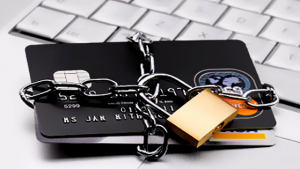Debit Card Nightmare
Debit Card Nightmare

 Boo! Since Halloween is right around the corner, I thought it would be a good time to discuss a scary situation we’re all facing.
Boo! Since Halloween is right around the corner, I thought it would be a good time to discuss a scary situation we’re all facing.
I landed my first job when I was 12 years old, delivering newspapers for the Peoria Journal Star. One of my job duties was to knock on the doors of my customers every Wednesday and collect payment for the newspapers. Each Friday at 6:00 p.m. I met with a representative for the Journal Star to pay him for the previous week’s newspapers.
I initially started out by giving my mom the money I owed to the Journal Star. She deposited the money into her checking account, and every week she wrote a check to the Journal Star. Each Friday when I met with the representative, I gave him the check from my mom.
My mom eventually took me to the bank and opened a checking account for me. After that, I wrote my own checks to the Journal Star.
When my first bank statement arrived in the mail, my mom taught me how to reconcile my checking account. That was over 45 years ago. To this day, whenever a bank statement arrives in the mail for one of my accounts, I take the time to reconcile the account.
Last month, a 19-year-old college-student client of mine told me that she had been charged overdraft fees of $70 by her bank for two separate transactions within the same week. She recently received a debit card from the bank and, like most of my bankruptcy clients, recklessly started paying for all her purchases with the debit card without keeping track of how much money was in her bank account.
When I told her that she needed to start writing down every purchase and keeping track of the balance in her account, she was shocked that I would suggest that she perform such a burdensome task. She responded with a question: “Why would I go to all the trouble of recording all my transactions when I can check my balance on my iPhone at any time of the day or night?”
When I reminded her that the same option was available to her when she incurred the $70 in overdraft charges, she assured me she was going to start keeping track of the balance in her account.
Yeah, right. The teenage college student is going to immediately change her behavioral habits. That’ll be the day.
Very few people carry checkbooks anymore. They don’t carry cash either. They don’t need to. Their wallets and purses are loaded with plastic cards that utilize a complex computer and data management system that transfers digital money from one account to another. These transfers take place millions of times a day.
As you may know, earlier this year news reports revealed that hackers had infiltrated the United States Office of Personnel Management’s computer system and had stolen the personal data files for every federal employee, every federal retiree, and up to one million former federal employees. The data that was stolen included Social Security numbers that were not encrypted — an outrageous oversight on the part of our government — and up to 780 pieces of additional information for each person.
Several sources revealed that it was the Chinese government that broke into our government’s computer system. In addition to employee and retiree data, the hackers were able to steal the records of the men and women who are members of our military.
I have an attorney friend who works for the United States Trustee Program, which protects the integrity of the federal bankruptcy system. One of his duties is to analyze bankruptcy cases to determine whether an individual who files for bankruptcy owns nonexempt assets that can be sold. The funds from the sale of those assets are then used to pay the creditors of that individual.
My friend told me that earlier this year he was notified by the Trustee Program that all of his personal information — and the personal information of his wife and children — had been stolen as part of the hacking operation that had taken place. When I asked him what the government was doing to ensure that he and his family are protected, he said that the government had signed them up for 18 months of free service with LifeLock, an identity theft protection company. I asked him what happens after 18 months, and he told me that after that they are on their own.
Mighty big of our massive government to “protect” my friend and his family.
In a recent Wired magazine article, it was revealed that hackers are able to access the wireless controls, via the Internet, of thousands of new motor vehicles. The hackers are able to tap into software that is part of a vehicle’s satellite entertainment system and then take control of dashboard functions, steering, brakes, and transmission. The hacking operation can be accomplished from a laptop computer that is thousands of miles away from a vehicle that is being targeted.
So here’s my question for you: What would happen if some hackers from a rogue government or terrorist organization decided to hack into our banking system and cause it to fail?
I’ll tell you what would happen. My college-student client and all the rest of us who use debit or credit cards would not be able to pay for gas, groceries, or any other goods or services. And we would not be able to withdraw cash from any of our bank or investment accounts. All ATMs would be “Out of Order.”
If that happened, how long would it take before the riots started? How would we pay for basic necessities?
Two years ago when the food stamp debit cards stopped working in California, Ohio, Michigan, Illinois, and 13 other states, within six hours, hundreds of individuals sent out Twitter messages that they would riot if the problem wasn’t quickly resolved. One message said, “EBT is down. There’s about to be a @#*&#%^ riot.” Another message stated, “They trying to be funny cutting EBT food stamps in Cleveland, OH. Well, a hungry enough man will KILL.”
Fortunately for the people who were affected, the company that was in charge of the Electronic Benefit Transfer system was able to fix the problem — a computer glitch — within 24 hours.
Can I make a suggestion? Start setting aside enough cash to cover at least three months of household expenses. All you have to do is imagine what would happen if you were unable to use a debit or credit card for several weeks and were also unable to withdraw cash from any of your accounts. It’s only a matter of time before a group of hackers shuts down our banking system. And there’s no telling how long it will take for our computer experts to get the system up and running again.
You’ve been warned.



1 Comment
DEAR HARRY AND GEORGETTE –
YOUR DESCRIPTION ABOVE SENT CHILLS THROUGH ME! AND I HAVE NO CREDIT OR DEBIT CARDS. I FEEL SORRY FOR THOSE WHO NEED TO HANDLE ANY MONEY MATTERS. THANK YOU FOR WARNING THOSE WHO COULD BE VICTIMS OF ANY HACKERS’ DEVIOUS ACTIONS. LOVE YOU! SISTER ROBERTA